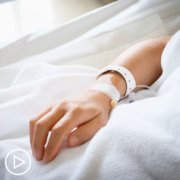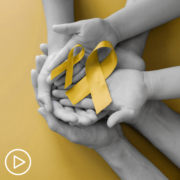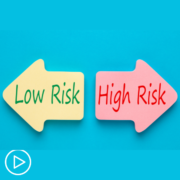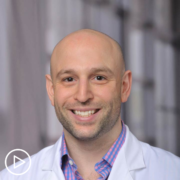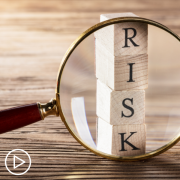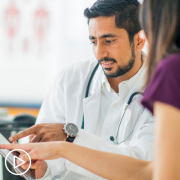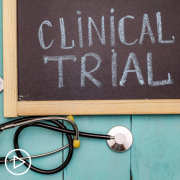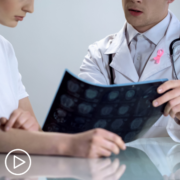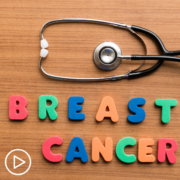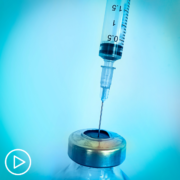Why Should Metastatic Breast Cancer Patients Consider a Clinical Trial? from Patient Empowerment Network on Vimeo.
Why should metastatic breast cancer patients consider participating in a clinical trial? Dr. Jane Lowe Meisel discusses when clinical trials may be considered, explains the stages of trials, and shares a valuable resource for patients.
Jane Lowe Meisel, MD is an Associate Professor of Hematology and Medical Oncology at Winship Cancer Institute at Emory University. Learn more about Dr. Meisel here.
See More From INSIST! Metastatic Breast Cancer
Related Resources:
Transcript:
Katherine:
So, you mentioned earlier, clinical trials. When should patients consider participating in a trial?
Dr. Meisel:
I think it’s a great question and I think the answer is really, almost any time. There are trials in every setting. So, I think one of the common misconceptions about clinical trials is that you really only should be in a clinical trial, or your doctor might only mention a clinical trial if they don’t have other options for you or if you’re really in stage. And I think that perception is changing. But I think the reality is that there are clinical trials in every setting.
So, we have clinical trails looking at prevention of breast cancer. Clinical trials looking to optimize early-stage treatment of breast cancer. Clinical trials looking at secondary prevention, so once you’ve had breast cancer, how can we reduce your risk of recurrence. And then lots of clinical trials in the metastatic setting both for patients who are initially diagnosed with metastatic breast cancer.
And then in second, third, fourth line and even for patients who have had tons and tons of additional therapy that we’re looking at new drugs for. So, I think at almost any juncture where you’re making a treatment change, it’s probably appropriate to say, would there be a clinical trail that you can think of that would be good for me in this setting? And it may be that there’s a one that’s 12 hours away, and it’s not convenient for you or feasible.
And maybe that your doctor doesn’t necessarily know of one but then that prompts them to ask a colleague who may be more involved in clinical trial design and development. Or it may be that there is one, but you ultimately choose not to pursue it because you have a different option. But I think it’s always appropriate to ask, would there be a trail for me? Because if there is, then maybe that opens up an option you hadn’t thought about before.
Katherine:
Sure. For patients who aren’t familiar with the stages of clinical trials, would you give us a brief overview of the stages?
Dr. Meisel:
Yeah. Absolutely. So, in terms of clinical trials that’re being done in humans, we talk about Phase I, Phase II, and Phase III typically. So, a Phase II clinical trial is typically an earlier stage trial.
Looking at either a drug that has not been tested in humans before or a drug that has not been tested in a particular combination in humans before. And so, those trials are done only in select institutions, usually academic institutions as opposed to private hospitals. And they often have what’s called a dose finding phase and then a dose escalation phase. So, the earliest part of those trials is actually looking at, what is the safest dose to give to patients?
So, they start the first patients at a low dose of the compound. And if those patients do well, the next patients that’re enrolled get enrolled at a slightly higher dose. And then up until they reach the highest dose they can find where people are tolerating it and doing reasonably well. And in those Phase I trials, doctors and investigators are also evaluating efficacy, is this drug working. But the primary goal of the early phase trial is actually to find the right dose to then study in larger groups. And so, if they find the right dose and there’s good biological rationale for the compound, then the trial would go on to a Phase II.
Which might be just what we call single arm Phase II study, where every patient is getting that experimental drug. And we monitor them to see, is the drug effective or is it less effective than the standard of care? Or sometimes they’re what we call, randomized Phase II trials where patients are randomized to either get the experimental drug, or to get what the standard of care would be in that situation. I think a lot of people get afraid about the idea of a randomized trial because they’re afraid they’re going to be randomized to a placebo. And that is really not done in the metastatic setting because it wouldn’t be ethical to give a patient with active cancer a placebo.
So, usually the randomization would be either to the study compound or to a standard of care drug. And then if things look good in a Phase II trial, then a Phase III study is done which is usually what the FDA requires to allow a drug to go on and be administered outside of a study for approval. And those Phase III trials tend to be larger studies that’re done in larger groups of patients with more statistical validity because of their size, to determine, is this drug really better than the standard.



